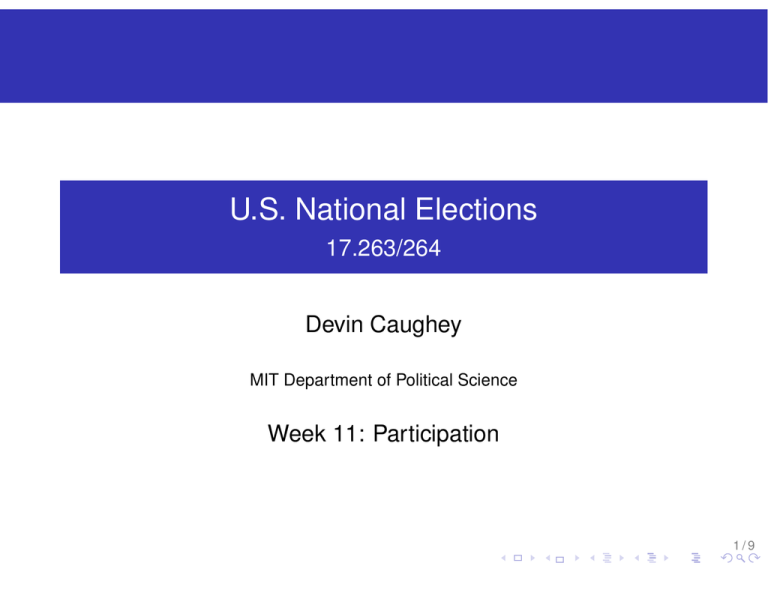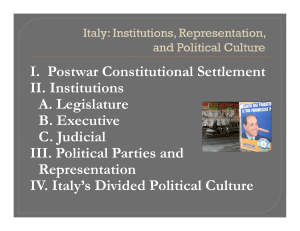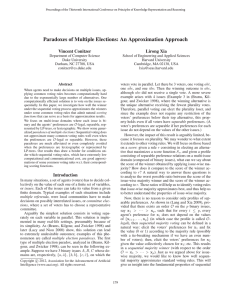U.S. National Elections 17.263/264 Devin Caughey Week 11: Participation
advertisement

U.S. National Elections 17.263/264 Devin Caughey MIT Department of Political Science Week 11: Participation 1/9 Themes of the Day (Back by Popular Demand) Voting as (ir)rational choice Different forms of participation have different determinants. Participation and social context (networks, pressure) Resource inequalities imply inequalities of political voice. 2/9 Why Do People Choose to Vote? The “calculus of voting” (Riker & Ordeshook 1968) Basic ingredients: Ci : costs of voting (time, attention) for individual i Bi : benefits to i of her preferred election outcome pi : probability that i’s vote will affect the outcome Individual i votes if the utility (Ui ) she receives is positive: Ui (Voting) = (Bi ⇥ pi ) Ci > 0 Question: How large is pi likely to be in most elections? 3/9 The “Paradox of Voting” Why do people vote? Misjudge probabilities? Possibly. Benefits that do not depend on outcome Calculus of voting, including D term (“civic duty”) Ui (Voting) = (Bi ⇥ pi ) Ci + Di > 0 Suggests that we should focus on Ci and Di and ignore Bi ⇥ pi . 4/9 Political Participation Other forms of participation feature the same collective action problem, but different sets of costs and benefits. Why don’t people participate in politics? 1 2 3 They can’t ! resources They don’t want to ! engagement Nobody asked them to ! social networks Socioeconomic status (income/education/occupation) strongly predicts participation, but for different reasons. 5/9 Political Resources Time (life circumstances) ! time-intensive activities, like protesting Money (income) ! campaign donations Skills (job, orgs, church) ! time/skill-intensive activities, like board membership 6/9 Political Engagement Subjective psychological constructs: Interest in politics/policy Sense of efficacy Identification as member of group with shared interest Difficult to separate from participation itself (endogenous) Engagement is most important for voting, where costs are low and resources matter less. 7/9 Social Networks Ui (Participation) = (Bi ⇥ pi ) C i + Di > 0 Two components of D term: Intrinsic: personal satisfaction at fulfilling civic duty, etc. Extrinsic: social consequences (others must observe) Social pressure is very powerful: ! Experiment: tell voters you will publicize whether they voted Voters/activists must be mobilized/recruited. ! Most effective from people you know or have connection to Explanation for long-term decline in voter turnout? 8/9 Voice and Equality Who do politicians “hear”? Voters but also donors/activists Biases in political “voice”: Voting: engaged citizens Donating: wealthy citizens Activism: citizens with skills and time All correlated with SES, but for different reasons. Inequality of voice may result in biases in representation (next week). 9/9 MIT OpenCourseWare http://ocw.mit.edu 17.263 / 17.264 U.S. National Elections Fall 2014 For information about citing these materials or our Terms of Use, visit: http://ocw.mit.edu/terms.

